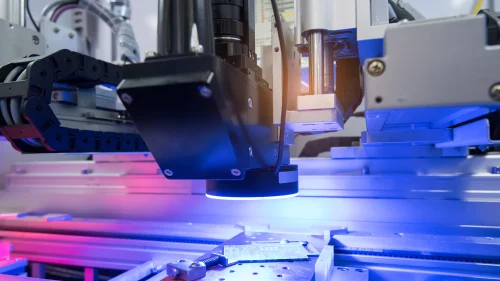In the fast-paced world of consumer electronics, the demand for flawless mobile phone cases has never been higher. As smartphones become integral to daily life, consumers expect their protective cases to be both aesthetically pleasing and functionally reliable. To meet these expectations, manufacturers are turning to advanced technologies such as Automated Optical Inspection (AOI) systems and machine vision systems to enhance quality control processes.
Understanding Mobile Case Defects
Ensuring the quality of mobile phone cases involves identifying and addressing various defects that can arise during manufacturing. Common categories of defects include:
- Surface Defects: These include scratches, dents, cracks, pits, and blemishes that affect the case’s appearance and feel.
- Structural Defects: Issues like misalignment, warping, thickness variations, and weak spots can compromise the case’s integrity and functionality.
- Aesthetic Defects: Discoloration, stains, inconsistent textures, and printing errors can diminish the visual appeal of the case.
- Material Defects: Problems such as air bubbles, contaminants, material cracking, and inconsistent hardness can affect durability and performance.
The Role of AOI Systems in Mobile Case Inspection
Automated Optical Inspection (AOI) systems have revolutionized quality control in manufacturing by automating the detection of defects with high precision and speed. These systems utilize high-resolution cameras and sophisticated imaging software to inspect products for deviations from quality standards. In the context of mobile case inspection, AOI systems offer several advantages:
- High Accuracy: AOI systems can detect minute defects that might be overlooked during manual inspections, ensuring a higher standard of quality.
- Speed: Automated inspections are conducted rapidly, keeping pace with high-volume production lines without causing bottlenecks.
- Consistency: Unlike human inspectors, AOI systems provide consistent evaluations, reducing variability in quality assessments.
- Data Collection: These systems can collect and analyze inspection data, providing insights into defect patterns and aiding in process improvement.
For instance, Intelgic provides AI-powered AOI systems tailored to automate complex inspection processes in manufacturing, enhancing both efficiency and accuracy.
Machine Vision Systems: Enhancing Inspection Capabilities
Machine vision systems are integral to AOI, combining high-resolution cameras with advanced software to interpret visual information. In mobile case inspection, these systems perform several critical functions:
- Defect Detection: Machine vision systems can identify surface defects such as scratches, dents, and discoloration by analyzing images captured during the inspection process.
- Dimensional Measurement: They ensure that mobile cases meet specified dimensions and tolerances, verifying aspects like thickness and alignment.
- Pattern Recognition: These systems can detect and verify patterns, logos, and text on mobile cases, ensuring correct branding and design elements.
Intelgic’s machine vision AI system offers automated solutions for high-speed, non-contact measurement and diameter inspection, ensuring consistent product quality and reducing human error.
Integrating AI into Inspection Systems
Artificial Intelligence (AI) enhances the capabilities of AOI and machine vision systems by enabling them to learn from data and improve over time. AI algorithms can be trained to recognize complex patterns and subtle defects, increasing the accuracy of inspections. Key benefits of integrating AI include:
- Adaptive Learning: AI systems can adapt to new defect types and variations, reducing the need for constant reprogramming.
- Predictive Analytics: By analyzing historical data, AI can predict potential quality issues before they occur, allowing for proactive adjustments in the manufacturing process.
- Enhanced Decision Making: AI provides detailed analyses and insights, supporting better decision-making in quality control management.
Intelgic’s Live Vision software exemplifies AI-driven defect detection, measurement, and Standard Operating Procedure (SOP) monitoring, ensuring optimal production line efficiency.
Implementing Inspection Systems in Manufacturing
Integrating AOI and machine vision systems into a manufacturing workflow involves several steps:
- Assessment: Evaluate the current inspection processes and identify areas where automation can provide the most benefit.
- Customization: Work with solution providers to develop systems tailored to specific products and production environments.
- Integration: Seamlessly incorporate the inspection systems into existing production lines, ensuring compatibility with other machinery and processes.
- Training: Train staff to operate and maintain the new systems, emphasizing the interpretation of data and maintenance procedures.
- Continuous Improvement: Regularly review system performance and update software and algorithms to adapt to new challenges and maintain high inspection standards.
Case Study: Intelgic’s Impact on Mobile Case Inspection
Intelgic has emerged as a leader in providing customized quality inspection systems for the manufacturing industry. Their solutions are powered by state-of-the-art AI designed specifically for defect detection. Key features of Intelgic’s systems include:
- Custom Electromechanical Systems: Tailored components automate material handling, positioning, and inspection processes, ensuring seamless integration into existing production lines.
- Precision Motion Control: Custom conveyor systems ensure consistent movement of parts under imaging devices, facilitating accurate inspections.
- Comprehensive Reporting: The system generates detailed reports and data logs, allowing manufacturers to monitor inspection performance and make informed decisions.
The integration of AOI systems and machine vision technology, enhanced by AI, is transforming mobile case inspection in manufacturing. These advancements lead to higher accuracy, efficiency, and consistency in quality control processes, ultimately resulting in superior products





























